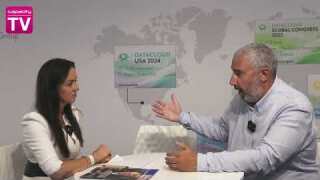
Automation and sustainability are among the most pressing concerns in today's global wholesale industry. A German player called Inter.link has sprung up in a bid to disrupt the network industry by providing these as inherent elements from the start. As one of the company's two co-founders, Theo Voss outlines its vision for faster innovation.
Automation and sustainability are two of the most on-trend topics in today’s wholesale market. Carriers, data centre players and content providers have been keen to emphasise their move towards comprehensive automation of all processes, from networks to sales, while demonstrating a laser-guided focus on green credentials.
But how far has the industry come with these aims? Though gradually moving in the right direction, not far enough, if you ask Theo Voss, CEO and co-founder of a company looking to shake up the international carrier market.
Berlin-based Inter.link is seeking to do this with a fresh approach enabled partly by its ownership of little legacy infrastructure, seizing on the chance to offer something innovative and disruptive in an industry often viewed as slow-moving. The goal is true end-to-end automation rather than bits and pieces interspersed with still-manual processes, while keeping sustainability in mind throughout.
Inter.link will provide services including IP transit, layer-2 connectivity, cloud services and DDoS protection. Customers seeking a mix of those services today may have to wait weeks or months for some elements to be provisioned, says Voss, whereas Inter.link is aiming to soon deliver them all in seconds via a self-service portal with fully transparent pricing.
“We see others moving in that direction, but we don’t see anyone offering that complete automated portfolio of connectivity services,” says Voss. “We’re trying to use a B2C mindset, despite not actually selling B2C. This involves things like fast turnaround times, easy reachability and a team of people that really want to help, change things and be accessible to the client.”
Origin story
The seeds of Inter.link were sown in the mid-2010s, when Voss worked at SysEleven, a hosting and cloud firm founded by Marc Korthaus. Seeing the need for improved network services in the market, the pair ended up working together to build a fibre ring in Berlin.
By the time the two later crossed paths again, they perceived an opportunity for much wider industry change amid the ramp-up in demand for automation.
This led to the pair’s formation of Inter.link, which kicked off its activity by acquiring the network assets of SysEleven in January 2022 – then comprising 15 European points of presence (PoPs). That gave the new company the best of both worlds, providing a fresh start but also some initial infrastructure as a springboard for growth.
“We’re a start-up and we aren’t one at the same time,” says Voss of Inter.link. “A few pieces came together: we had this opportunity on the SysEleven side, as well as experience from our past years in the industry and good momentum to build on.”
Ready to scale
The business debuted its new self-service portal in April. That paves the way for a fuller launch of Inter.link this summer, after it has deployed more infrastructure and a wider array of services on the portal.
The company’s plan is to rapidly scale by adding 35 new PoPs this year – not just in Europe, but also the US, Asia and Oceania. The aim is then for at least one new PoP monthly until the end of 2026, with Latin America and Africa also being explored as regions for expansion. All this will give Inter.link a global network with a backbone based on merchant silicon, offering 100G and 400G wavelengths for the moment.
The lack of legacy infrastructure will aid rapid rollout, says Voss, while automation will free up salespeople to be “storytellers” for the company rather than focusing on tasks like preparing quotes. “It removes so many inhibitors, and we can grow and sign up clients faster,” he adds.
On top of that, Inter.link has been able to build sustainability as an inherent part of its business. As a result, he says, the company is already carbon-neutral and plans to be net-zero for emissions by 2025 – ultimately saving money by using less energy.
And Inter.link’s strategy includes ensuring sustainability not just in its own processes, but throughout the supply chain, says Voss. “We started with requesting lifecycle data from vendors and went into very detailed discussions,” he says. “We’ve built the whole company based on principles of sustainability.”




